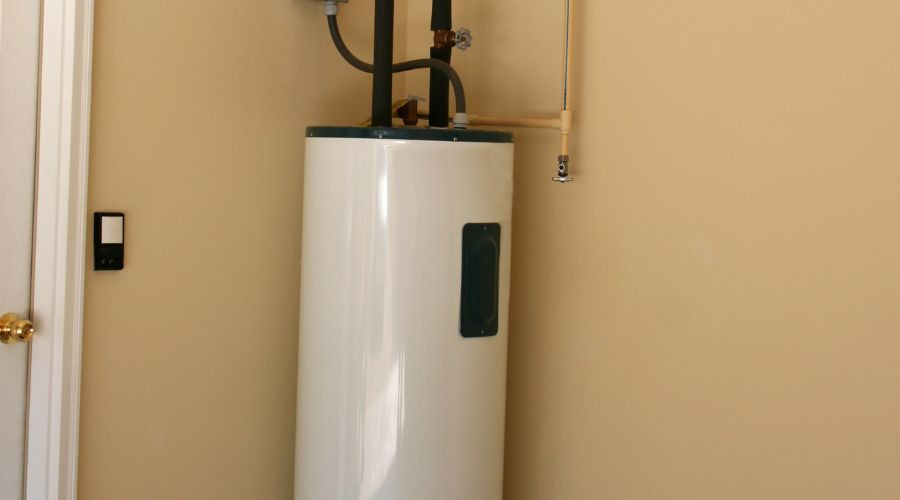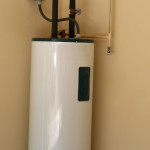A Guide to Water Heater Replacement
Nobody wants to get stuck without hot water, so caring for the water heater is important. However, eventually, a water heater replacement will be needed. Homeowners don’t have to wait until their water heaters break down and get stuck taking cold showers before calling a plumber to replace their water heater. Warning signs to get a water heater replacement can alert homeowners to the need to replace the water heater, allowing them to call for replacement before losing hot water or dealing with leaks and water damage.
This post will discuss important things to know about water heater replacement, including signs it’s needed, the benefits of replacing an old water heater, and the pros and cons of electric and gas water heaters.
Signs to Replace an Old Water Heater
 Being able to recognize the signs that indicate water heater replacement is necessary is important for homeowners to help avoid unexpected cold showers and potential water damage. A water heater works tirelessly behind the scenes to provide the household with hot water, but there are some unmistakable red flags that signal it’s at the end of its lifespan.
Being able to recognize the signs that indicate water heater replacement is necessary is important for homeowners to help avoid unexpected cold showers and potential water damage. A water heater works tirelessly behind the scenes to provide the household with hot water, but there are some unmistakable red flags that signal it’s at the end of its lifespan.
A corroded water heater is a clear sign that it needs to be replaced. However, there are a few signs that can indicate corrosion other than the visible rust and corrosion on the water heater tank. Discolored hot water, hot water that looks rusty, and hot water with a distinct metallic smell are indicators of internal tank corrosion. The corrosion process weakens and deteriorates the tank, which can cause leaks and water damage around the water heater. A leaking water heater is another sign that replacement is needed.
The water heater’s age is another sign that can determine when replacement is needed. A conventional hot water heater typically lasts about 8-12 years, so when the water heater has been in service for over 10 years, it’s a sign to get a replacement. As water heaters age, they experience declining efficiency, leading to higher utility bills despite unchanged usage. So, high water heating costs with an older water heater can also point to the need to replace the water heater.
Some other telltale signs that water heater replacement may be needed include a complete lack of hot water, insufficient hot water for the household's needs, and a water heater that requires frequent repairs. When homeowners notice signs that it’s time to replace the water heater, they should call a plumber to inspect it and determine whether a replacement is the right solution.
The Benefits of Replacing an Old Water Heater
 Replacing an old water heater and installing a new one can provide several benefits for a household. Energy efficiency suffers as water heaters age, so old water heaters cost more to operate. Additionally, new high-efficiency water heater models are more energy efficient than water heaters installed a decade ago. So, replacing an old and inefficient water heater with a new, more energy-efficient one can improve the home’s energy efficiency and reduce utility bills.
Replacing an old water heater and installing a new one can provide several benefits for a household. Energy efficiency suffers as water heaters age, so old water heaters cost more to operate. Additionally, new high-efficiency water heater models are more energy efficient than water heaters installed a decade ago. So, replacing an old and inefficient water heater with a new, more energy-efficient one can improve the home’s energy efficiency and reduce utility bills.
Newly installed water heaters will also be more reliable and have a lower likelihood of experiencing problems and requiring water heater repair. So, replacing an old water heater with a new one can also help reduce how much homeowners spend on repair costs and eliminate inconvenient service calls and the discomfort of losing hot water when problems occur. Additionally, new water heaters can provide a noticeable improvement in performance. Modern water heaters can offer faster hot water recovery rates, meaning less waiting time for hot water after the hot water from the tank is used up.
Electric vs. Gas Water Heaters
When planning a water heater installation, one important decision is choosing between an electric water heater and a gas water heater. Each type has pros and cons. Electric water heaters offer installation and safety advantages. They have a lower upfront cost and are easier to install. However, they have higher operational costs than gas water heaters. Installing an electric water heater is also safer, as it avoids the risks that come with using natural gas, such as gas leaks and carbon monoxide poisoning.
On the other hand, gas water heaters have lower operational costs, heat water faster, and have higher heating capacity than electric water heaters, which makes gas water heaters a great choice for large households. Additionally, while electric water heaters won’t work during a power outage, gas water heaters are often functional during power outages. However, they cost more upfront than electric water heaters and pose the risk of a gas leak.
About Plumb Perfect Plumbing
Plumb Perfect Plumbing has more than 20 years of experience serving the Fredericksburg community. They provide 7 days a week service, flat-rate pricing, and financing. Call them for water heater replacement and installation services in Fredericksburg, VA.
















